10 most memorable moments of 2021
Highlights and puzzle pieces from the peloton that made headlines this past season
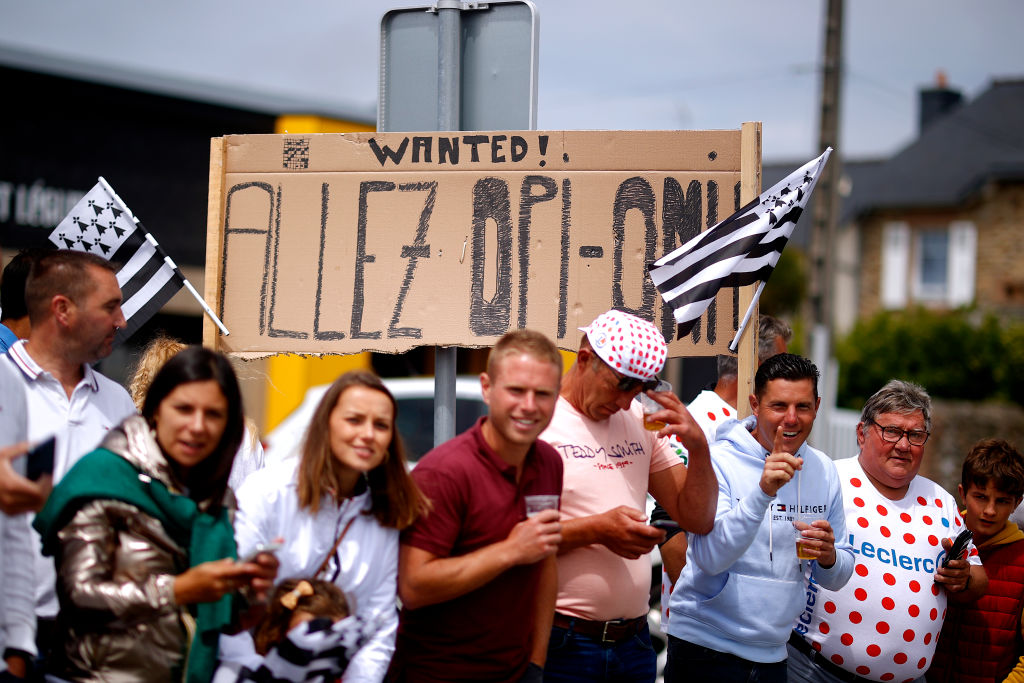
Opi-Omi crash
We are used to seeing crashes on the opening stage of the Tour de France when riders' legs are fresh, nerves are high, and the pressure to take the first maillot jaune is immense - but it's thankfully rare that we see a yard sale as huge as the one caused by a spectator carrying the now-infamous "Allez Opi-Omi" sign.
The sheer violence of the crash was jaw-dropping. Tony Martin, leading the Jumbo-Visma train in pursuit of lone leader Ide Schelling with 45km to go, had nowhere to go and ploughed into the sign that the woman was holding into the road. The German's fall sparked a massive chain reaction crash that left dozens of riders injured.
Martin was so shaken up and disgusted that he would end his career saying: "The bad crashes this year have also caused me to question whether I am ready to continue to face the risks that our sport involves."
Another fall, this time just outside the last 10km, was even worse as the peloton was building up to lead-out speed. All told, there were at least 21 riders injured in the stage, with Ignatas Konovalovas (Groupama-FDJ) the worst off. He spent 11 days in hospital in Brest with head trauma, three fractured vertebrae and an injury to his pancreas that needed to be monitored.
The drama did not end with the stage, as the mainstream global media worldwide picked up the story on the 'Opi-Omi' spectator, who faced criminal charges from the local prosecutor as well as a symbolic civil law suit brought by the CPA meant to bring attention to pro cycling's safety concerns.
The spectator's lawyer said she "recognised the dangerous nature of her actions" and had "expressed regret", and prosecutors recommended a suspended four-month sentence. A verdict is expected on December 9.
What made the incident so terribly memorable was the fact that there was one misguided individual who stepped a half metre too far into the road while not paying close enough attention to the race, and they could be blamed for sparking such a huge crash.
The latest race content, interviews, features, reviews and expert buying guides, direct to your inbox!
The combination of slow-motion footage, the catchphrase, and easy finger-pointing made Opi-Omi go viral. The second crash that injured riders more seriously hardly earned a mention because it started with simply a touch of wheels.
Mark Cavendish's renaissance
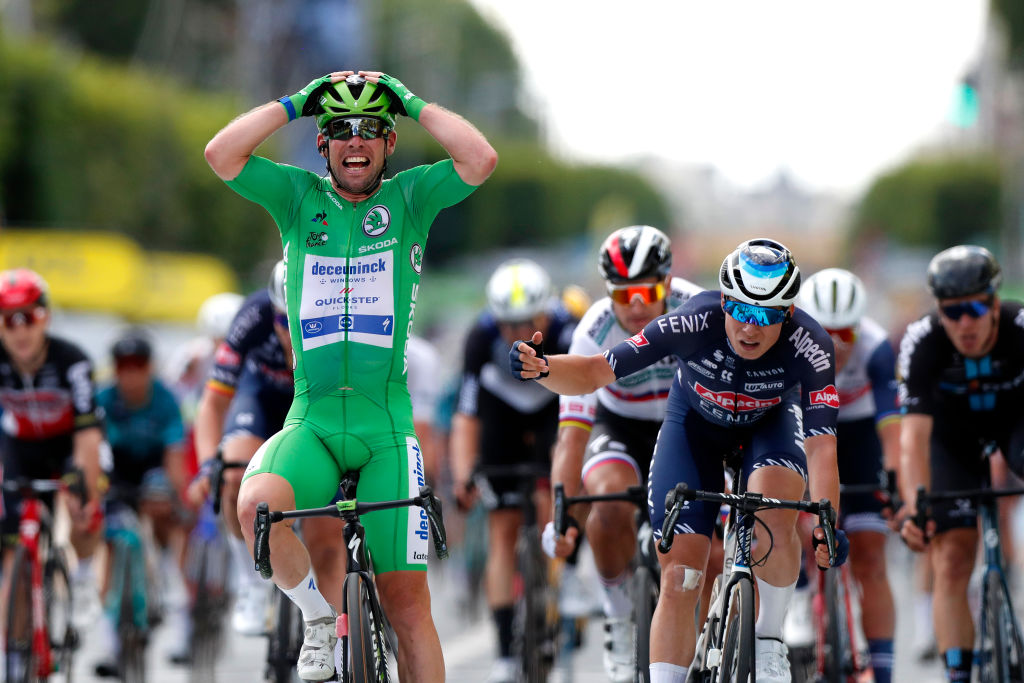
It had been five years since a truly competitive Mark Cavendish had raced the Tour de France and in many ways that alone represented success for a rider who had months earlier appeared on the brink of retirement.
Illness, injuries and limited racing had effectively combined to derail the rider’s career. Until a last-minute reprieve from Patrick Lefevere and QuickStep, it looked as though the Manxman’s career was over.
However, the stars began to align for Cavendish almost as soon as he began racing in 2021. A couple of decent placings turned into a string of wins in the Tour of Turkey. When Sam Bennett picked up a mid-season injury and then fell foul of Lefevere, the team made a last minute change with Cavendish given the Irishman’s place.
Cavendish rarely fails to take an opportunity and on the first major sprint stage of the Tour he rolled back the years with a consummate win in Châteauroux - the same location he won his first Tour stage in 2008.
Given how far off the pace Cavendish had been between 2017 and 2020, his turnaround in form was nothing short of miraculous. The fact that he went on to add another three stages, a second green points competition jersey, and equal Eddy Merckx’s all-time record of 34 Tour stage wins, made Cavendish’s Tour de France one of the most memorable events of 2021.
Mathieu van der Poel Tokyo Olympics crash
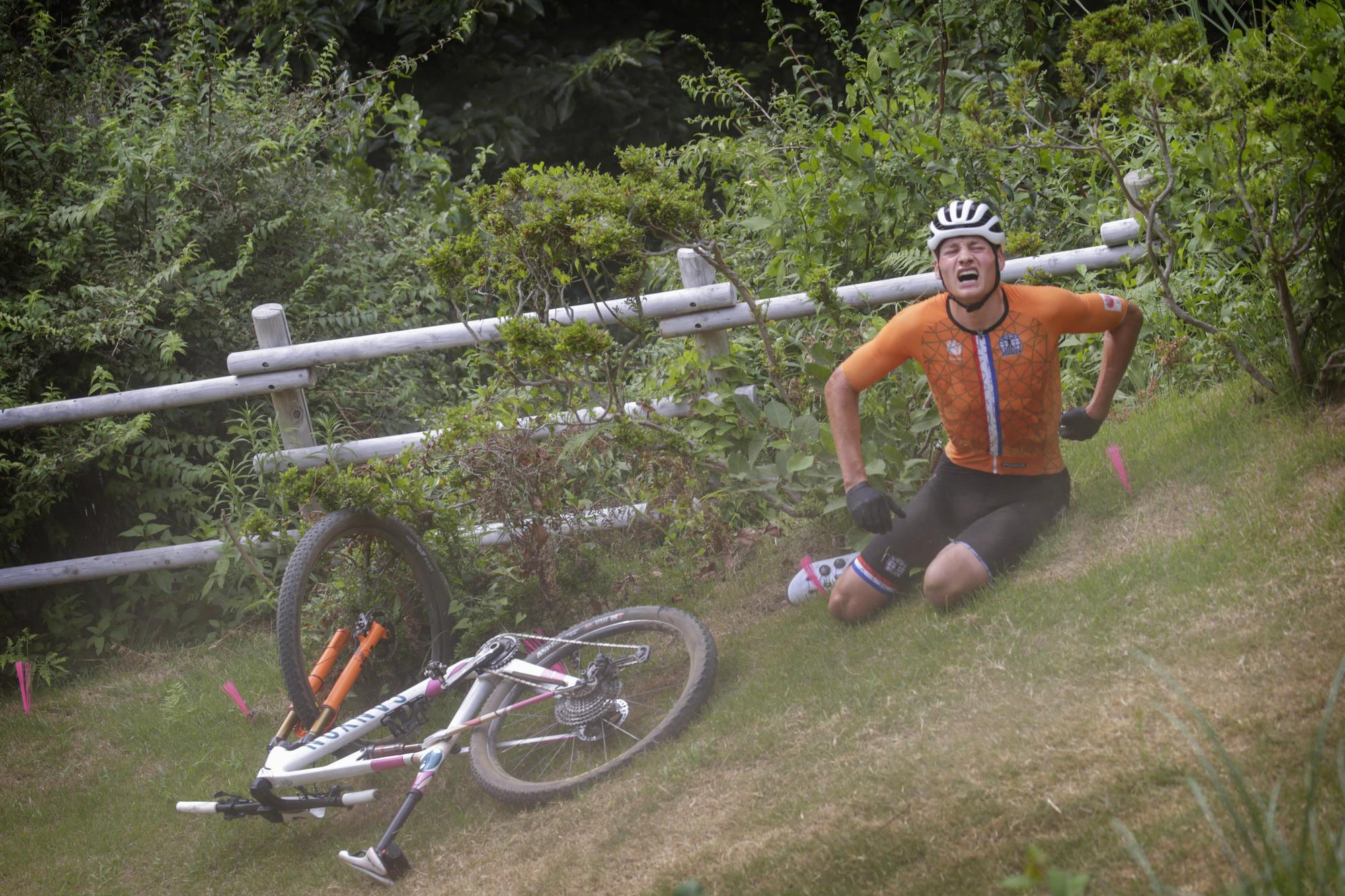
Heading into the Olympic Games in Tokyo, Mathieu van der Poel was one of the favourites for the medals in the men's Mountain Bike Cross-Country event, and the Dutch team had spent days carefully examining the course and formulating their strategy. However, a late course change - and whether or not Van der Poel knew about it - ended his race in a dramatic fashion.
Van der Poel was sitting in fifth wheel on the opening lap when he came to the steep Sakura drop - a rock ledge that during the reconnaissance sessions had been fitted with a wooden ramp.
When Van der Poel approached the drop, his weight was too far forward - anticipating being able to roll down the ramp, his wheel instead found air and he crashed over the bars and down the slope, hitting the ground just as eventual gold medal winner Tom Pidcock swept past.
The crash sparked debate about whether or not Van der Poel should have known the ramp would be removed. He stated on social media that he was unaware it would be removed for the race, he only knew it was taken out for the test event in 2019. But his teammate Milan Vader, who finished 10th, said the team had discussed the ramp being removed at lunch.
Fortunately, Van der Poel escaped serious injury and could look back at the Tour de France stage win and six days he spent in the leader's jersey as consolation.
Olympic Games Men's Team Pursuit
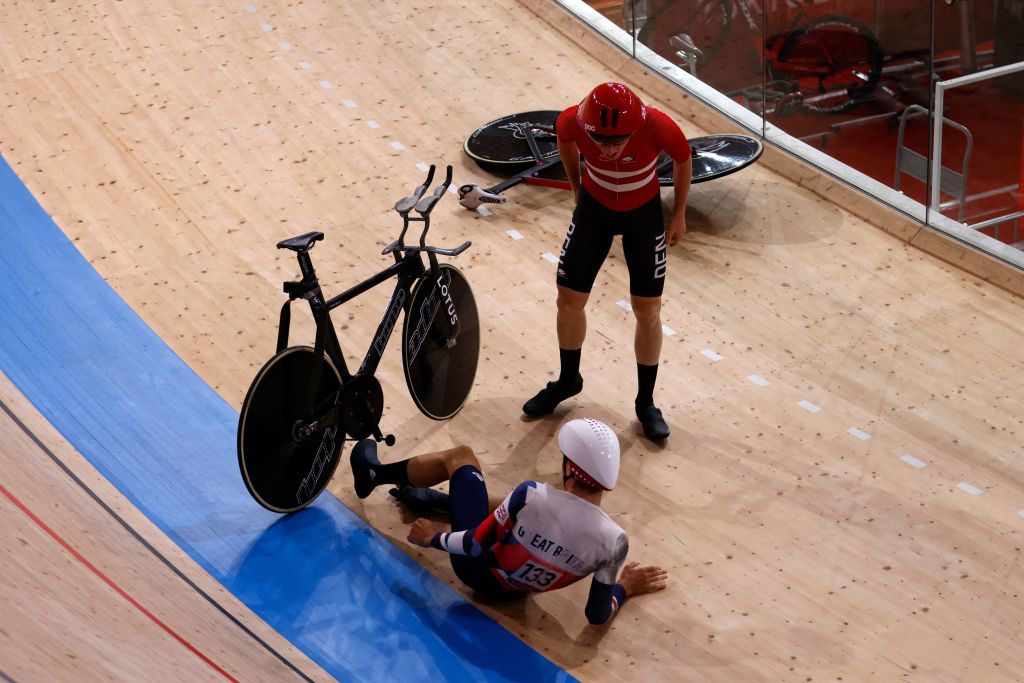
The Team Pursuit rounds at the Olympic Games in Tokyo had an unusual amount of drama right from the opening round crash when Australia's Alex Porter's bars appeared to snap in half all the way to the scintillating final two days later.
The Danish team were in the centre of two controversies, using Kinesio tape for a slight aerodynamic advantage and their head-down crash into the team from Great Britain in the second round.
During the qualifying round, Chris Boardman noticed the Danish riders all sported the same strip of flesh-coloured Kinesio tape down their shins, writing on Twitter, "Every rider with the same injury on both legs requiring ‘medical tape’ down the front of their legs, coincidently exactly where it would be aerodynamically advantageous..."
British Cycling's Stephen Park said the Danish team should be disqualified but instead, they took the tape off for the next round. They were about to catch Great Britain when disaster struck.
Frederik Rodenberg was leading the Danes out of the turn onto the straight at the same time Britain's Charlie Tanfield had lost contact with his two remaining teammates. Head down, Rodenberg did not see Tanfield until it was too late, and both were sprawling to the track.
The jury ruled that the Danes had caught Great Britain and would move onto the gold medal final, while Tanfield had to get up and finish the race for his team to get a time toward selection for the finals. But by the time he crossed the line, they were way out of contention.
In the final, all of the previous drama was soon forgotten, however, as Italy - with Filippo Ganna taking a particularly massive pull in the final kilometre - came from behind to snatch the gold medal from the Danes by 0.171 seconds.
Their world record performance at 3:42.032 capped off what would go down in the books as one of the most dramatic Team Pursuit competitions in history.
Lizzie Deignan makes history at Paris-Roubaix Femmes
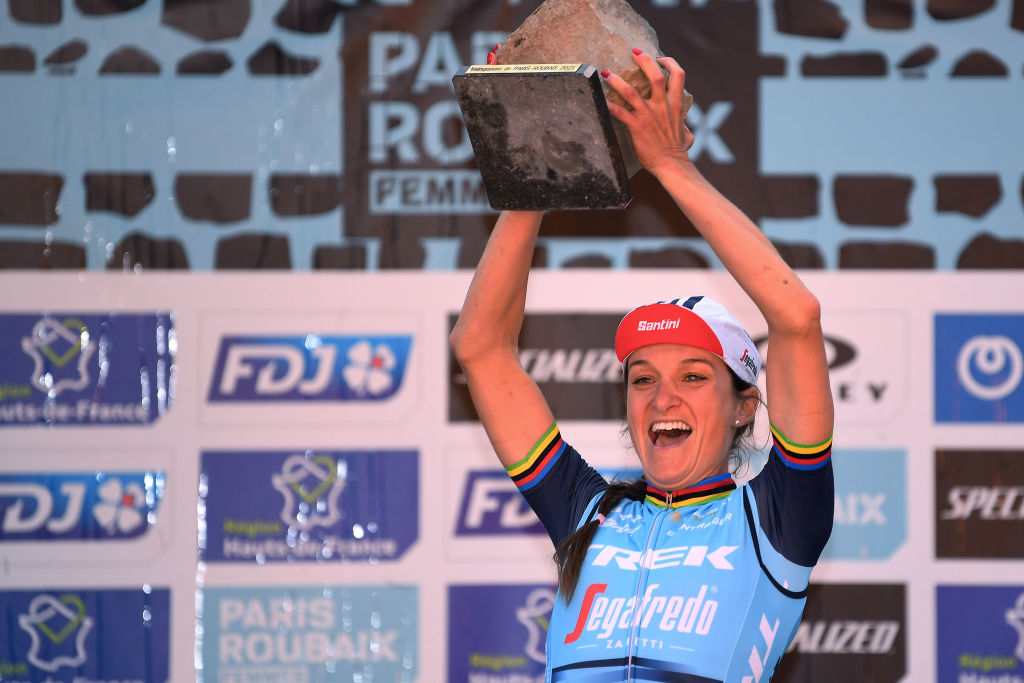
Taking a victory from a breakaway is not unusual for Lizzie Deignan but her win on October 2 made history, not just headlines.
The Trek-Segafredo rider rode solo off the front for 82 kilometres to win Paris-Roubaix Femmes, taking a giant step in cycling as the first-ever woman to win the one-day monument.
Deignan jumped away on the first of 17 sectors of pavé after 34 kilometres of racing and seized a gap. Her margin of 2 minutes and 15 seconds began to fade with 20km to go, as rival Marianne Vos (Jumbo-Visma) launched an attack across the pavé sectors of Camphin-en-Pévèle and then the five-star Carrefour de l'Arbre.
Deignan dug deep in the muddy, wet conditions and held on for a 1:17 winning margin on a victory lap around the Roubaix velodrome.
The Hell of the North had been on the men's racing calendar for 117 editions as the most celebrated Monument, so when the Paris-Roubaix Femmes was rescheduled three times over the past two years due to the COVID-19 coronavirus, it only made the inaugural race more memorable.
129 riders took to the start line in Denain for the 116.4km of mud slinging misery, and they used words “brutal”, “chaos”, “painful” to describe the journey. Deignan called it “surreal’.
“I raced today with the power of generations of women who were denied the opportunity to battle for this Monument and with my daughter [Orla] in my heart who I hope will never face the same barriers they had to,” she wrote on Instagram.
Bernal-Martínez duo land Giro d'Italia victory
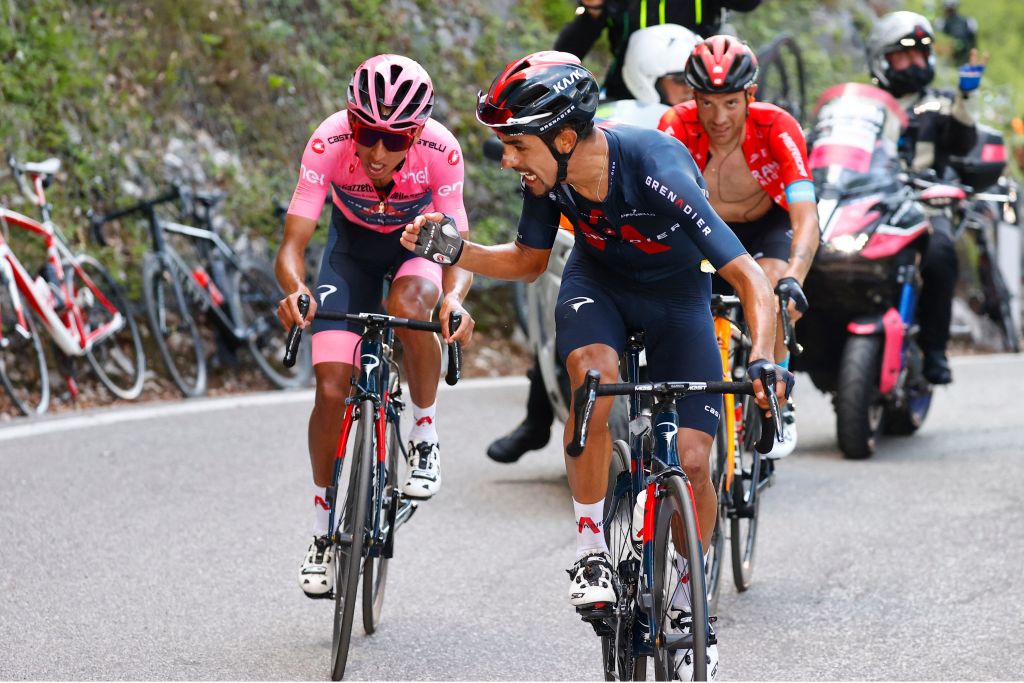
In the end, Egan Bernal (Ineos Grenadiers) was pretty in pink in Milan, having stamped his authority on the Giro d'Italia during the white gravel stage to Montalcino and then through the snowy inclines of the Zoncolan and Passo Giau. However, he may have cracked massively and even lost the race, if not for teamwork, especially from fellow Colombian Dani Martínez.
Multiple attacks in the final four kilometres of the unforgiving climb of the Sega di Ala from eventual stage winner Dan Martin (Israel Start-Up Nation) and GC contenders Damiano Caruso (Bahrain Victorious) and Simon Yates (Team BikeExchange) exposed weakness in Bernal.
Strong encouragement - with legs and with lungs - by Martínez was captured in photos with a raised fist as he directed morale-boosting words to Bernal, and the duo fought across the four final kilometres to the mountaintop finish. Bernal lost time but not the pink jersey.
"Dani [Martínez] is a friend, it was very important to have him on my side today, he waited for me and gave me morale,” said Bernal after stage 17.
Two days later on stage 19, it was Martínez who tapped out a tempo on the Alpe de Mera that allowed Bernal to save some energy and battle over the remaining 2.5km to the finish, losing just 28 seconds and bonus time to Yates.
On stage 20, Caruso held the edge with the stage victory at Alpe Motta, while Martínez set the pace for Bernal until the final kilometre. The Colombian pair finished two-three and Bernal only relented 24 seconds to Caruso.
Bernal and Ineos did enough to ensure that he entered the stage 21 time trial to Milan with an unconquerable advantage atop the overall standings, winning by 1:29 over Caruso and 4:15 over Yates.
If Bernal’s lingering back problem was a handicap in the third week of the Giro, it was Martínez's persistent support that helped him to the overall victory.
'Jewel' of women's cycling unveiled for 2022
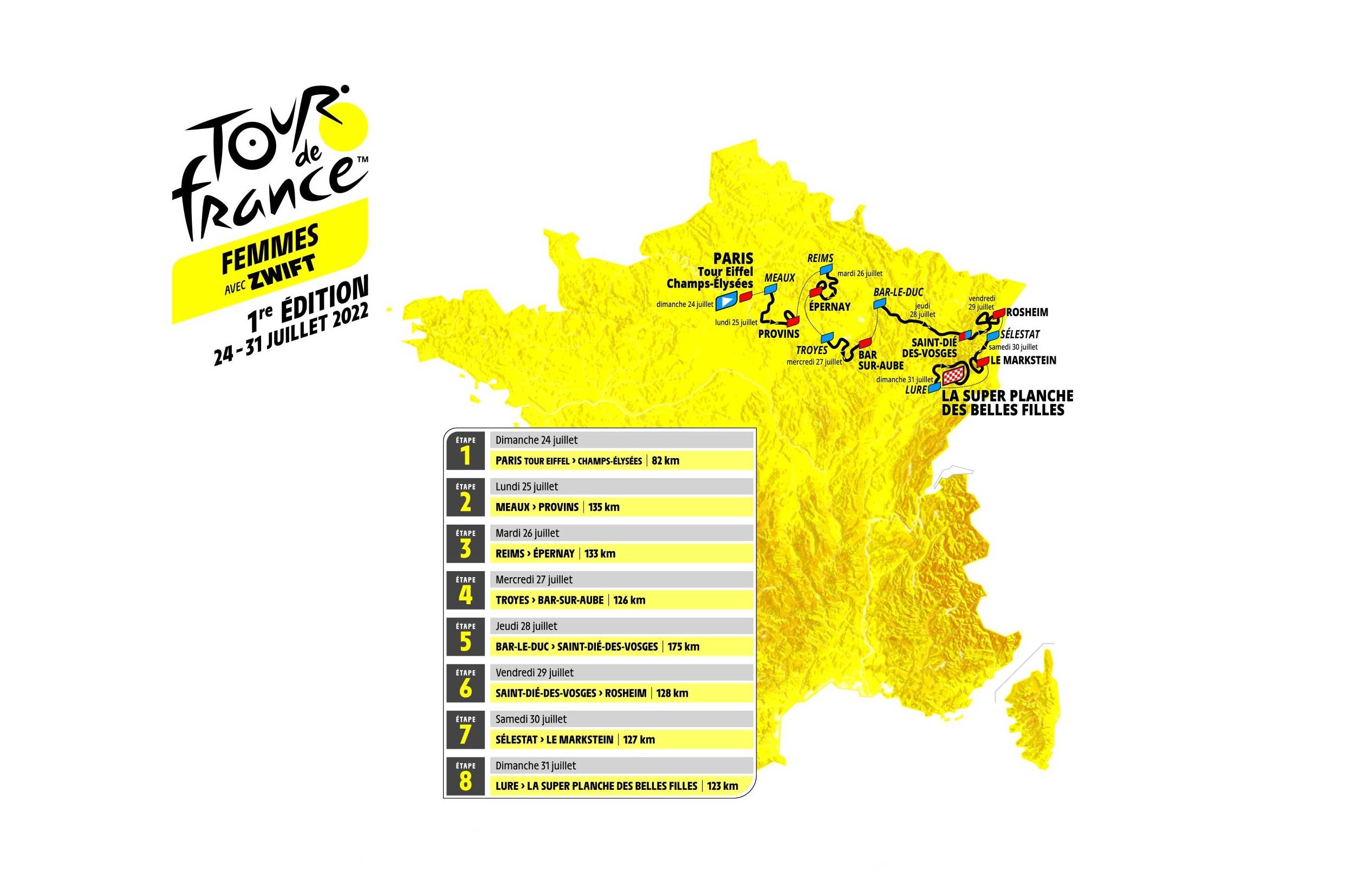
One of the most significant moments of the past year did not take centre stage on a climb, in a sprint or in a breakaway, but rather it grabbed the spotlight, literally, on a stage when the route of the Tour de France Femmes avec Zwift was presented. The race is set to take place July 24-31, 2022, immediately after the men's Tour de France.
In mid-October at the Palais des Congrès in Paris, organisers Amaury Sport Organisation (ASO) unveiled the route of the Tour de France Femmes along with the route for the Tour de France. It has been 33 years since women had a multi-week contest for their own maillot jaune. The men’s Tour de France began in 1903, while the women’s ASO-run version was first held in 1984 and then ended in 1989.
The long-awaited route announcement revealed 1,029 kilometres of racing, beginning with a start at the iconic Eiffel Tower in Paris and a finish eight days later atop La Planche des Belles Filles, one of the hardest climbs in professional cycling. The race covers all types of terrain, including gravel, but will not have an individual time trial in its opening edition.
An all-star cast of female riders were in Paris for the route presentation, including newly-crowned World Champion Elisa Balsamo (Valcar Travel & Service), Paris-Roubaix winner Lizzie Deignan (Trek-Segafredo), and Deignan’s teammate Audrey Cordon-Ragot, the current French time trial champion and placed second in the road race.
“Today is an important day for women’s cycling,” Balsamo said at the route presentation. “Next year the female Tour de France will be amazing.”
With such a variety of stages within the race, the yellow jersey should change hands multiple times. The event begins the day following the men’s finish on Avenue des Champs-Élysées.
“We really wanted a Grand Départ from Paris, in which there is a symbolic handover from the men's race to the women's. That’s why it was important to leave from the Eiffel Tower,” said the newly-appointed director of the reborn event is Marion Rousse, a former French National Champion.
“Since I retired from racing I have seen more teams, more resources and more money in women's cycle racing. This is a jewel that we must cherish.”
A 30th Giro d'Italia Donne stage win for Marianne Vos
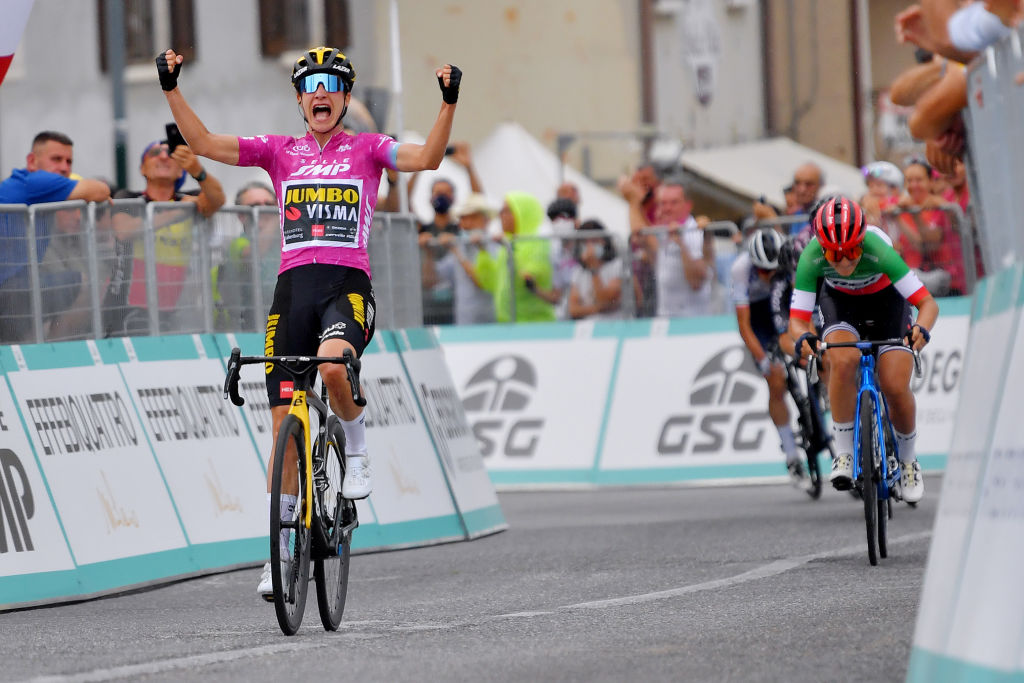
The moment was set in train on stage 3 when Marianne Vos (Jumbo-Visma) took off in the break and then got the best of her three companions, securing that 29th win at the Italian stage race with her hands pointed to the sky in a tribute to cyclo-cross rider Jolien Verschueren who that week had lost her life to cancer.
That heartfelt victory with six stages of the race still to go made it almost inevitable, given Vos’ record at the race, that this was the year we would see the phenomenal Dutch rider deliver yet another target that not long ago seemed an impossibility. In 32 editions of the Giro d’Italia Donne, no other rider has cracked 20 stage wins, so there could be no underestimating the scale of her achievement in being within reach of 30.
With a time trial on stage 4 attention turned to stage 5 and 6 to see if she could make the mark, though these were sprints won by riders who excel in a bigger bunch so it was a case of close, but not close enough for Vos. She finished third on both the stage to Carugate and Colico.
Stage 7 was punctuated by climbs creating a tough race and finishing with an uphill that would make it even harder for most sprinters to survive. For good measure there was even a tricky run into the line to play right into the hands of the 34-year-old’s extraordinary bike handling skills.
There was no way the fiercely competitive Vos was going to let this chance go. She jumped onto Elisa Longo Borghini’s wheel as she attacked with little more than a kilometre left. Vos then sat on the wheel of the Italian, only launching to the front as the peloton closed in. She flew through the final tricky bends to take a clear-cut win and that record breaking 30th victory.
Vos was, true to character, delivered a typically down to earth response when asked about her victory, acknowledging that 30 was an “incredible number” but then quickly applauding her team for putting her in the right position.
Others, however, were quite prepared to sing her praises, with Mark Cavendish calling her “the absolute GOAT”.
It’s a statement that’s hard to argue with, as not only is the Giro d’Italia Donne stage win total just one of the many impressive entries on her palmares but the total of 30 over 10 Giro d’Italia Donne’s comes from fewer than 90 stages, delivering a staggering win rate of one in three. What’s more with other placings thrown in she’s stood on the podium in well over half the stages she has raced.
Time at Movistar unravels for Miguel Ángel López
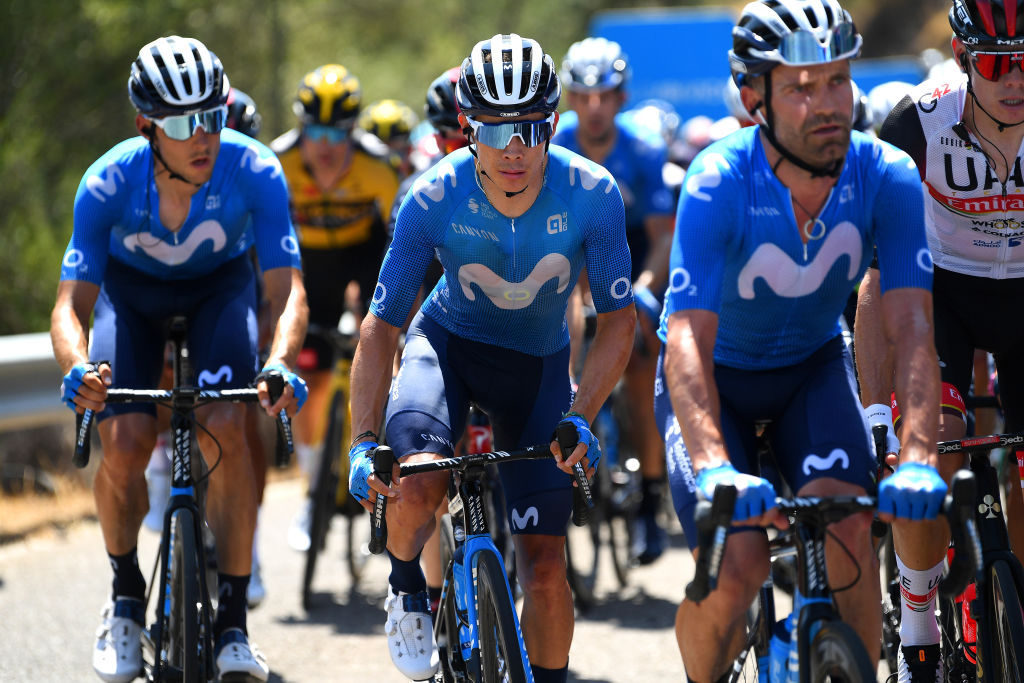
Miguel Ángel López will soon link up with his Astana teammates at a pre-season training camp in Spain and it will seem that the past 12 months will feel like some sort of fever dream.
Did he really move to Movistar for 2021? Did he really win some races and sign a two-year extension in the summer? Did he really get off his bike mid-way through the penultimate stage of the Vuelta and refuse to ride on? Did he really climb into a car while on the phone to a team manager telling him precisely not to?
Yes, all that happened, and the 2021 season was all the more dramatic and memorable for it.
Up to that point, López to Movistar had looked like a masterstroke of a signing. Despite his debut being delayed due to COVID-19, the Colombian hit the ground running when he raced, winning a stage and the overall at the Ruta del Sol in May, followed by the Mont Ventoux Challenge. What’s more, his time trialling – his major weakness - seemed to be improving significantly. He was sixth at the Dauphiné before a crash derailed his Tour de France, but he was still handed a two-year contract extension ahead of the Vuelta.
Just a month later the contract was torn up. Has anything unraveled quite that fast?They precise reasons for Lopez’s sudden exit from the Vuelta will probably not be known for some time, given the non-disclosure agreement signed by both parties.
The facts are that López, who had won the queen stage 48 hours previously, was caught out by a split in the favourites’ group and saw his podium position slipping away. He gave chase before suddenly giving up.
Some saw a rider who couldn’t cope with adversity, while his father has suggested he was told by team directors to stop chasing so as not to bring anyone else closer to teammate Enric Mas, who was second overall and up the road.
The aftermath was handled far better, with little public comment before a ‘mutual’ agreement to part ways was announced in late September, although López has since added to the juice with claims he was blocked from riding the Olympics and that dual leadership was handled badly by the team.
It's not sure if Movistar are planning another series of their Netflix documentary, but they’ll have plenty more material for it if they do.
The world vs Anna Kiesenhofer
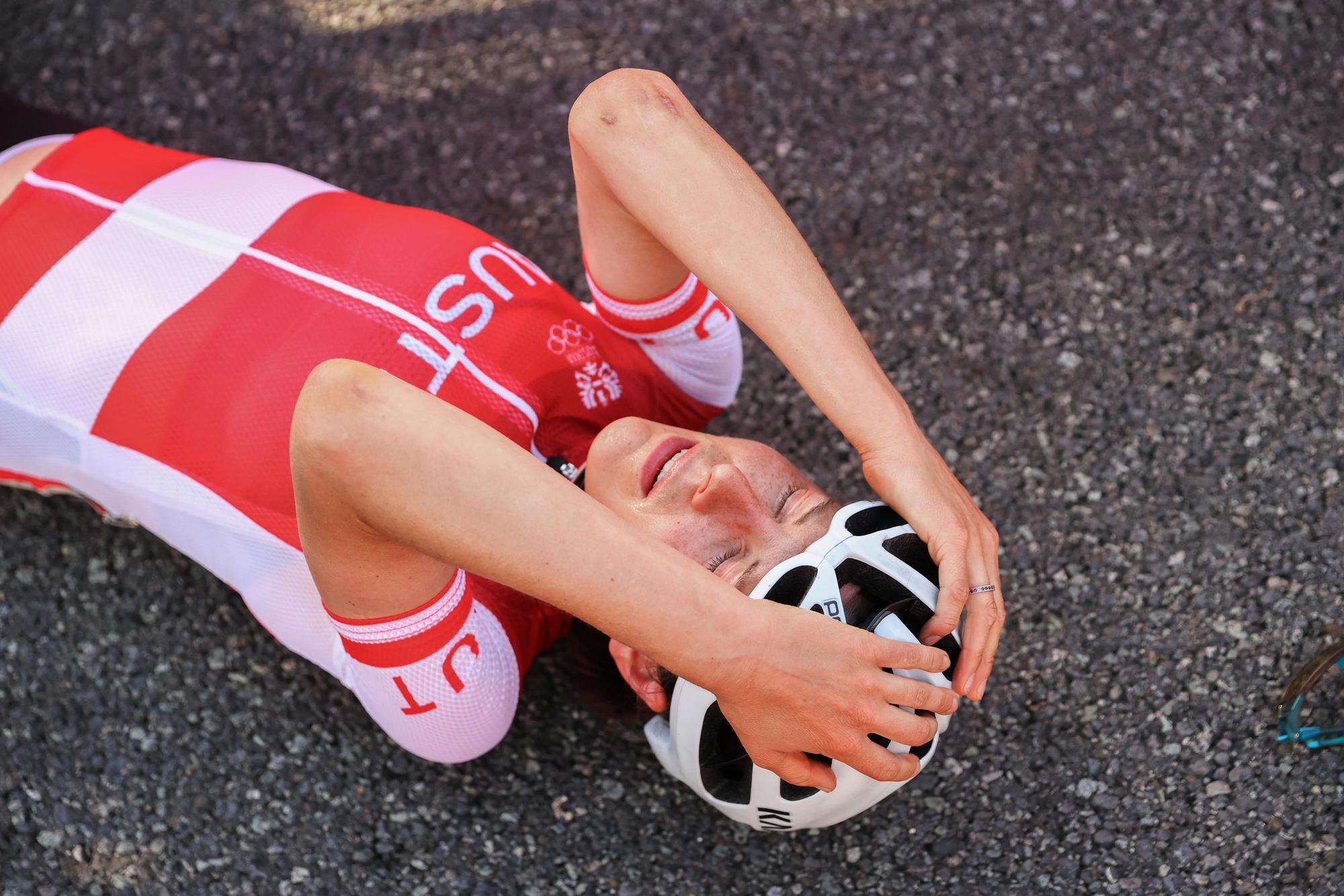
When Anna Kiesenhofer dropped her final breakaway companions and went it alone at more than 40 kilometres to go in the tough women’s Olympic Games road race, there seemed almost a sense of inevitability she’d be caught. Surely a solo rider, and a relative unknown at that, couldn’t hold off the charging horde, particularly on a course that played so beautifully to the strengths of an absurdly strong Dutch team.
Her results tally was solid over the years but the university lecturer and researcher had nothing like the glittering palmares of those in hot pursuit. She’d also been out the front since the start of the day while others had been sitting back in the peloton being tended to by teammates, who were now also ready to destroy their own chances in pursuit of the Austrian.
Kilometre after kilometre ticked over and the 30-year-old maintained the momentum and the gap. The seemingly inevitable fade didn’t come even when one of the most dominant racers in the women’s peloton, Annemiek van Vleuten, was hot in pursuit.
At the start of the race it had seemed like it was a case of Netherlands against the world, as they had four of the top five ranked cyclists in the professional peloton on their squad. By the closing kilometres, however, it was the world versus Kiesenhofer and the underestimated Austrian won.
The experienced Dutch got it wrong, leaving the chase of the rider, who was on paper at least an amateur, too late, just as the other big teams did.
Van Vleuten got it wrong when she thought she’d done enough to chase down everyone in the break and came over the line celebrating more than a minute down as if she was claiming gold not silver. Cycling commentators and writers also got it wrong. Nobody had picked Kiesenhofer as a potential winner.
Somehow in the end, though, all this getting it wrong seemed so gloriously right. It would be hard to script a better ending for an Olympic Games than an exciting race, full of suspense, with an unforeseen ending that inspired hope against all odds.

Jackie has been involved in professional sports for more than 30 years in news reporting, sports marketing and public relations. She founded Peloton Sports in 1998, a sports marketing and public relations agency, which managed projects for Tour de Georgia, Larry H. Miller Tour of Utah and USA Cycling. She also founded Bike Alpharetta Inc, a Georgia non-profit to promote safe cycling. She is proud to have worked in professional baseball for six years - from selling advertising to pulling the tarp for several minor league teams. She has climbed l'Alpe d'Huez three times (not fast). Her favorite road and gravel rides are around horse farms in north Georgia (USA) and around lavender fields in Provence (France), and some mtb rides in Park City, Utah (USA).